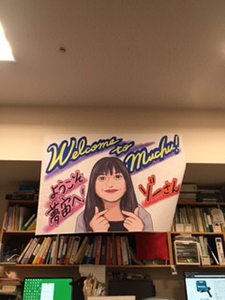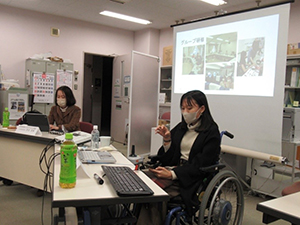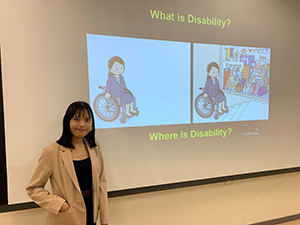Final Report
Zo's Final Report
Letters of acceptance for me from the Duskin Leadership Training arrived in the middle of 2020. I am very keen to learn about issues of PWDs employment, welfare system for PWDs, barrier-free design support tool, perspectives of women with disabilities, as well as principles and implementations of universal design. Hopefully, I would be able to learn from Japan and implement the knowledge I earn for myself and my own community.
However, due to the pandemic, I had to start the program by learning Japanese online for a year. As a Japanese Literature student, it was a wonderful opportunity for me to improve my Japanese language skills. I also took part in a Shuwa (sign language) class since I had a huge interest in sign language. I also participated in Japanese classes for deaf foreign people living in Japan.
Me, my sensei (teachers), and other participants were separated by thousands of kilometers and still, I learned a lot about Japanese culture, expression, as well as new methods and approaches of teaching. I truly could not imagine how much I will learn once I actually visit Japan and experience the whole life directly if I could learn so much even online.
That day came in the middle of April 2022.
Shortly after my arrival, I was introduced to four other training participants named Jasmin (Philippines), Kavinda (Sri Lanka), Wen (Cambodia) and Wai (Myanmar). Thanks to them and their unique personalities, I was able to enjoy the time we shared during our group trainings. I still vividly remember how they surprised me on my birthday with cakes and flowers. Together, we participated in some group trainings with an expert of disability issues in Japan, in which they introduced their activities and program to us.
The Duskin Leadership Training also provided individual training for me learn many things that might help me achieve my goals. First, I learned how to provide accessible books for visually impaired people at ATDO. I also participate in Disability Equality Training, in which I learned about facilitation skills. I need to sharpen presentation and facilitation skills to make communication, so that I can encourage, facilitate, and help people.
Furthermore, perhaps the thing that I literally had no experience about was the concept of independent living for PWDs. In my life, I needed to be self-reliant. I could not, by all means, rely on others since I saw reliance as a form of weakness. I thought that relying on people gave them as chance to pity me.
People at Muchu Center, with their knowledge, interactions and principles, taught me that self-reliance does not mean that we need to always do everything alone. They helped me realize that it is okay to have others support me to make my decisions and dreams realities. To this day, I have continued to internalize that belief. They also help me realize how important having peers is to share our pain and struggles in life with.

The next journey was to participate in NPO UNI, they provide a whole support program for students with disabilities. I learned how to do captioning in meetings and classes, which really helps PWDs with hard of hearing and/or unable to do sign language. Even a practical step like captioning makes such a difference to students’ learning experience. It helps me understand the framework for supporting PWDs in their education programs.
At Step Edogawa, I was taught disaster prevention drills for PWDs. I learned that disaster prevention is a comprehensive system rather than brief instructions on “what we should do to reduce the risks of disaster.” This prevention principle could be introduced in my country, especially for PWDs so we could do necessary tasks during disasters. This is important considering that Indonesia’s geographical location is prone to disasters due to its multiple volcanoes and tectonic plates.
Society in Indonesia treats people with severe disabilities as ‘sick’ people needing to stay in bed or inside home all the time. Step Edogawa gives examples on how to help people with severe disabilities get out of their homes, breathe fresh air and enjoy life. This has made me think about how to support severely disabled people in Indonesia.
To enhance my knowledge on barrier-free technologies, I visited the Kanagawa Institute of Technology for two days and was amazed how they could implement their technological knowledge to provide tools to make life easier for PWDs. The university introduced me to students who are responsible for researching assistive tools for elderly and PWDs, and they explained to me how they produced such helpful inventions. It was an amazing visit. They were making such a significant effort to establish a barrier-free learning environment for the students.
I remember during our conversation, the students said, “You have a disability, but you speak normally.” It surprised me since there are so many, even perhaps most PWDs have no barriers in communication and actually speak just like I do on a daily basis. I learned that although the students’ research was about tools for PWDs, they barely interacted with PWDs on a daily basis.
I was glad to spot this issue since it opened my eyes that even in Japan, the problem of PWD visibility in larger society and their whole interaction still exist. Back in Indonesia, I always attended public schools that normally did not provide comprehensive assistance for me as a PWD. Yet, I learned how to make myself visible and take part in society designed for able people, although there were times when lack of accommodation hindered my progress to learn more in my school days.
Eventually, I often observed that PWDs who spend most of their time in ‘controlled environment’ often found it hard to cope with larger social setting. This phenomenon might indicate that although barrier-free and accessibility innovations are well-advancing, we need to also understand how to integrate PWDs and non-PWDs to live in harmony.

I am impressed and grateful for the chance to live in Japan since it is unarguably the first time I could function better as a human being. Everything feels designed for everyone’s sake, so that everyone can benefit from it. In Japan, I could commute, do my chores, and shop by myself using wheelchair. I felt at ease knowing that I could easily find toilet anywhere.
I even took trip on ships and watched baseball games. I clearly see how even severely disabled people can go out and have fun with other people, with proper assistance. I can visit many places here. I took trips to museums and art galleries. I visited so many prefectures, and I also had the luck to spot Mt. Fuji from a close distance. I enjoyed the vibes of autumn leaves spread around the parks. Sometimes, I grabbed a nice coffee or foods at nearby cafes and restaurants.
Although the mindset is important, we need to reduce physical barriers in order to make life easier for PWDs and help them function better as human beings – the same feeling I feel living here. The feeling of functionality gives us power, boosts our confidence, and at the end of the day, it is indeed liberating.
And I believe that once we feel liberated, the sky is the only limit.
After finishing this training program, first thing first, I would like to report my progress and the detail of the training program to my university disability center. It is important for both me and the organization to learn together about barrier-free situations.
Secondly, I would like to document my journey in Japan in the form of accessible books, to share my experience and knowledge. Hopefully, the book will help non-PWDs understand the dynamics of PWDs’ life and understand us better. Not only that, but I also want to translate a manual book for spina bifida so everyone could have a deeper understanding of the condition and be able to work together to create a better life for people with spina bifida.
I would also like to work on my future and get a decent job. I believe that once I no longer have to worry about my own well-being, I would be able to contribute more for PWDs in my country. However, I also want to start contributing with some steps that I could take with my current capabilities.
Furthermore, I want to resume my English classes for people with disabilities. I think I could improve the previous program with the knowledge and experience I have right now. I also believe that women with disabilities need a safe space to consult others and exchange information. I will utilize my facilitating and presentation skills to provide the space they need.
At my graduate school, I would like to study disability science, especially the relationship between people with disabilities and people without disabilities. Japan is making progress in developing a physically barrier-free society, but neither Indonesia nor Japan has shown progress in building barrier-free relationships between people.
People who took me on during this training always had faith in me to do something, which was why I could fully believe in myself that I could do something. Having someone believing in my capability, who doesn’t doubt and underestimate me, gives me a huge amount of confidence and helps me gain my self-esteem.
I learned a lot in Japan. The senior leaders have been doing amazing work to protect PWD rights and make PWDs’ lives better. My next homework is to adjust this good implementation and principle and apply them to my country. I will participate and provide activities or programs that suit my country’s situations, barriers, issues and culture.
I would like to thank the Duskin Ainowa Foundation and all of the organizations involved in this life-changing experience.
Most of the people I know congratulated me saying I surmounted the ‘impossible’ to get this amazing opportunity.
Maybe I did. But then again, it would not have been so important if the barriers had not been there.
And I look forward to playing a part to help PWDs in Indonesia to not need to face many barriers. Playing a part that makes the ‘impossible’ our usual achievement. The part that helps shape the world in which our disabilities won’t matter as much.





